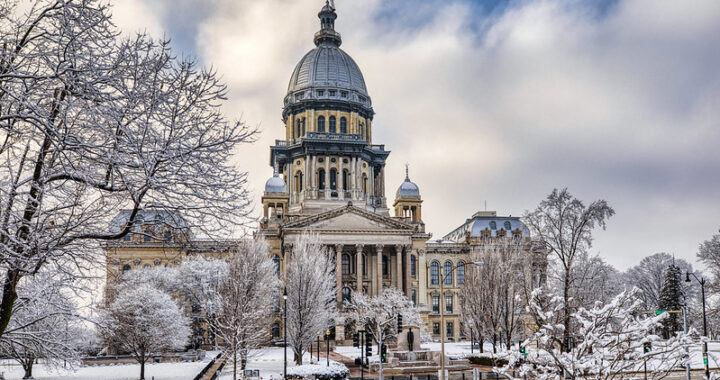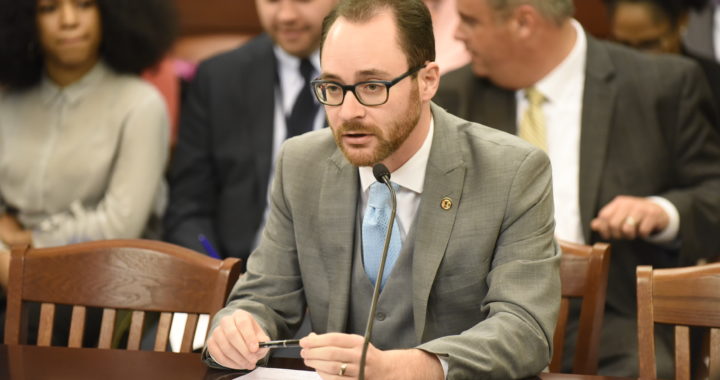This legislative session, Rep. Didech is the chief sponsor of 12 bills to strategically advance climate action and environmental protections across Illinois. Each bill is summarized below.
Climate bills
HB5461: CCURRB: Concrete Carbon Utilization Reduction and Removal Breakthrough Act aka the “Concrete Carbon Act”
People produce more concrete than any other material on Earth, and its global production is only slated to grow. Meanwhile, concrete is one of the planet’s most energy-intensive products. Together, concrete and cement (the powdery binder holding the crushed stone or sand in concrete together) production contributes ~9% of annual carbon emissions globally.
This bill will incentivize the production and deployment of reduced carbon dioxide emission concrete statewide, addressing the hard-to-abate, energy-intensive industry. To do this, it establishes a 1) performance-based tax credit for concrete producers to incentivize the use of materials and methods for state-funded projects that reduce the embodied carbon of concrete and/or support the removal of “legacy” carbon already in the atmosphere and its permanent storage in concrete; 2) tax credit for concrete producers to defray the cost of implementing environmental product declaration technology at plants. It also requires the implementation of performance-based specification standards for concrete and directs the Department of Transportation to assess and propose opportunities to accelerate testing and evaluation of new decarbonization methods and materials for concrete by the Materials Bureau.
HB5117: Deforestation-free Procurement Act
It has been estimated that at least 30% of the world’s greenhouse gas emissions come from deforestation and forest degradation. Taking into account carbon sequestration potential, experts estimate that stopping the loss of tropical forests, mangroves, and wetlands will achieve over 20% of climate mitigation by 2030. With this in mind alongside Illinois’ statutory commitments to achieving critical climate goals, the bill would require state agencies to procure products from contractors complying with newly established standards to prevent sourcing of products that contain forest-risk commodities linked to deforestation or forest degradation. Eligible contracts can become certified deforestation-free providers or simply confirm they are supplying compliant products by conducting due diligence. Taken together, the State has a unique opportunity to lead emissions reductions and catalyze the market for deforestation-free products through its procurement and regulatory choices.
HB5176: Solar-Powered Buildings Act
Solar energy is an important tool to enable consumers to reduce their energy costs, fight the climate crisis, tackle air pollution, and provide safe energy while facilitating production where it is consumed, thereby lessening the burden on aging electric transmission lines and reducing energy loss over long distances. To encourage urgent and widespread adoption of solar energy in line with its statutory commitments to achieving its zero-carbon emission goals, this bill would require all new construction to install fully operational solar panels on rooftops of eligible buildings. It requires all building permits issued 90 days after the effective date of this Act in a new, large multifamily residential building or a large multifamily residential building being renovated by a developer converting the property to an association to be built to accommodate the installation of a solar energy system on the roof. It also requires all building permits issued 24 months after the effective date of this Act to accommodate the installation of a solar energy system on their roofs in new construction single-family residence or small multifamily residence that qualifies as an affordable housing development under the same project ownership and is located on a campus to be built to accommodate the installation of a solar energy system on their roofs. Unless provided otherwise in this Act, all new residential and commercial buildings shall be built to accommodate the installation of an on-site solar energy system with preference for rooftop solar energy systems, and it makes specific requirements for a solar energy system to produce electricity. This applies to new buildings constructed after the effective date of this Act.
HB5315: Act to Allow Homeowners to Install Solar-Powered Doorbells
Amends the Homeowner’s Energy Policy Statement Act. Prohibits the adoption of a bylaw or exercise of any power by the governing entity of a homeowners’ association, common interest community association, or condominium unit owners’ association that prohibits or has the effect of prohibiting the installation of a solar energy system installed for the primary purpose of providing solar energy to a video doorbell. Provides that the Act applies to any solar energy system installed for the primary purpose of providing solar energy to a video doorbell.
HB5119: Street Light Energy Conservation Act
Brought to us by two constituents, this bill provides that, within 5 years after the effective date of the Act, each street light entity (a unit of local government, a public utility, and the State) exercising control over any street lights in the State shall install or replace each street light in the State, subject to appropriation, as follows:
– the street light must be installed or replaced using LED technology;
– the minimum illuminance must be adequate for the intended purpose of the street light and must be used with consideration given to nationally recognized standards;
– for lighting of the State highway system, installation or replacement applies only if the Department of Transportation determines that the purpose of the street light cannot be achieved by the installation of reflective road markers, lines, warning, informational signs, or other effective passive methods; and
– installation or replacement shall occur only after full consideration has been given to energy conservation, reducing glare, minimizing light pollution, and preserving the natural night environment.
It includes exceptions to the requirement to install or replace each street light in the State with LED technology. Limits the concurrent exercise of home rule powers. Effective immediately.
HB4915 and HB4943: Two Bills to Enable Increased Funding for Active Transportation & Public Transportation
Inspired by one of our outstanding summer intern’s legislative project, Rep. Didech has filed two bills to enable increased funding for active transportation planning and public transportation. The first bill would amend the County Retail & Occupation Tax to allow counties to collect tax to put toward the active and public transportation initiatives. The second would amend the motor fuel tax to require certain municipalities and counties to allocate at least 1% to improve, develop or incentivize the use of non-carbon emitting transportation infrastructure. These bills would allow counties across the state to increase funding for critical, non-carbon emitting active transportation and public transportation purposes as a means to decarbonize the transportation sector as well as create more low-cost transportation options.
Environmental bills
HB5658 and HB5659: Reducing Microplastic Pollution through Manufacturing Incentives and Consumer Rebates
It’s increasingly known that our laundry systems shed harmful microfibers, and one way to protect our waterways from microfiber pollution is to install microfiber filters to prevent these from being washed into the waterways. To increase the availability and accessibility of effective filters, incentives are required. These two bills will help stimulate manufacturing of microfiber filters to help the industry transform to address the pressing concern of microplastic pollution. The first bill will provide manufacturing incentives by offering credits to qualified microfiber filtration manufacturers against tax requirements. The second bill would require the Illinois Environmental Protection Association to establish a program to provide rebates to Illinois residents to purchase a microfiber washing machine filter or replacement microfiber washing machine filter.
HB5118: Sludge Control Act
Research indicates that sludge often contains toxic chemicals, including PFAs (also known as “forever chemicals”). Applying sludge for land use purposes has become a long-time practice and poses contamination concerns. This bill provides that person may not: (1) apply to or spread on any land in the State sludge generated from a municipal, commercial, or industrial wastewater treatment plant, compost material that included in its production sludge generated from a municipal, commercial, or industrial wastewater treatment plant or septage, or any other product or material that is intended for use as a fertilizer, soil amendment, topsoil replacement, or mulch or for other similar agricultural purpose that is derived from or contains sludge or septage; or (2) sell or distribute in the State compost material that included in its production sludge or septage or any other product or material that is intended for use as a fertilizer, soil amendment, topsoil replacement, or mulch or for other similar agricultural purposes that is derived from or contains sludge or septage. Sets forth exceptions. Defines terms. Repeals a provision in the Environmental Protection Act regarding the regulation of farm land sludge application.
HB4499: Foil Balloon Act
Mylar balloons, also called foil balloons, are made using plastic nylon sheets with a metallic coating that will never biodegrade. According to research, they also cause thousands of power outages every year when they come into contact with power lines or circuit breakers. This bill provides that a person who manufactures a foil balloon in this State or a person who sells or distributes foil balloons that are filled with lighter-than-air gas in this State shall comply with specified requirements. Provides that the requirements do not apply to manned hot air balloons or to balloons used in governmental or scientific research projects. Provides that specified requirements are subject to a phase-in period of 4 years. Provides for violations and civil penalties.
HB4814: Birds & Bees
Neonics are the most-used insecticides in the country and are increasingly considered some of the most ecologically destructive pesticides since DDT. Experts say that their use has driven down crop production due to the consequent mass losses of bees and other pollinators that come into contact with them and that neonics have made U.S. agriculture 48x more harmful to insects. The EPA stated that neonics likely jeopardize the continued existence of 200+ threatened and endangered species- roughly ~11% of the entire endangered species list. Further, neonics have been found in rising levels within the human body, posing threats to health. Provides that, beginning January 1, 2027, no person shall sell offer for sale or use, or distribute within the State any corn, soybean, or wheat seed that is treated or coated with a pesticide that has certain active ingredients, unless the Department of Agriculture determines there’s an insufficient amount of commercially viable alternative seed available or the alternative seed that’s available would provide an undue financial hardship on agricultural producers. Sets out limitations on the application of pesticides containing the same active ingredients on outdoor ornamental plants and turf except in specified circumstances. Directs the Department of Agriculture to conduct a study to identify alternatives to the prohibited pesticides.








